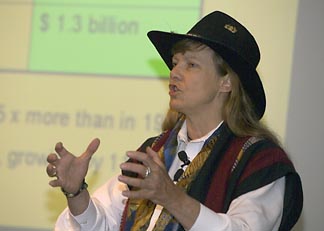New materials and processes make world's future look 'green,' say sustainability experts
By Linda Myers

Rising prices at gas pumps are a reminder that the world's supply of fossil fuels is shrinking and may be depleted by as soon as the year 2025, said presenters at an international conference on sustainable technology and new-market creation held at Cornell University July 20-22.
The good news: Alternatives to nonrenewable, petroleum-based products are growing, as well. One such product is "green" composites -- biodegradable, renewable and fully sustainable material made from soy protein. "Composites can be as strong as some steels," said Professor Anil Netravali, a fiber scientist in textiles and apparel at Cornell, who is using nanotechnology techniques to make resins and other materials from natural sources stronger, more durable and more heat- and water-resistant.
The potential for green composites was among the innovations presented at the 11th BELL (business, environment, learning, leadership) Conference at the Johnson Graduate School of Management in Sage Hall. It was co-sponsored by the school's Center for Sustainable Global Enterprise and the World Resources Institute (WRI), a nonprofit that promotes sustainability worldwide. Attending the event, which was packed with ideas, were 150 people from academia, industry and nonprofit and nongovernmental organizations.
Netravali, who spoke at the "Innovations on the Edge" discussion, said that panels made from green composites were strong enough to withstand, without damage, the weight of 1,700 heavy and light vehicles, which were driven over them in a U.S. Army test. Such composites might eventually be used in houses, cars and even temporary roads anywhere in the world, he said, since the materials to make them are inexpensive and can be grown anywhere. Composites will be especially useful in the world's poorest countries, said Netravali, who, with colleagues, also is working to use such fibers as flax, sisal and ramie yarn as well as spider silk.
In the panel discussion "Eco-innovations and the Established Firm," Robert Wheeler, with the A.M. Todd Co., which produces mint flavorings for chewing gum, candy, mouthwash and toothpaste, described his firm's initiative to turn into useable compost the "spent" mint hay left over from the mint oil extraction process. "We're looking for ways to turn challenges into environmental opportunities," he said. "Our ultimate dream is to have our main product become a byproduct."
Hunter Lovins, founder and president of Natural Capitalism Solutions, a nonprofit that is working to rebuild Afghanistan sustainably, among other projects, said that current U.S. efforts in the region are misdirected because they don't "build local capacity," but instead "are lining the pockets of U.S contractors and making the beltway bandits rich." Sporting a cowboy hat and boots as she delivered the keynote address in Duffield Hall, she regaled the audience with ideas for introducing renewable energy to the world's fifth-poorest country rather than investing U.S. dollars in coal plants in nearby Tajikistan -- a risky move in an unstable region, she said. Lovins advised participants to follow her lead and make their efforts toward sustainability "personal." For example, "$13,000 will put solar panels on the roof of an Afghani orphanage, and I'm gonna raise it," she said.
"Seeing businesses and hearing about the real problems they are facing helped me put important issues [about sustainability] in perspective," said Judith Wall, a doctoral student at Rensselaer Polytechnic Institute who is studying environmental strategy, management and corporate governance.
Bob Wiebe, an operations analyst in advanced research and development for civil and military technology at Boeing-Phantom Works, said: "I liked the overall training, particularly how systems dynamics can help you build a technology road map. And the networking is awesome."
Shoshannah Lenski '06, Arts and Sciences, whose honors thesis is on corporations and the environment, said, "One of the interesting things about the field is that it's so new and moving so quickly that I can get a lot more out of meeting with people than from books and articles." Lenski attended the conference as part of a Cornell program supporting undergraduate research.
"We designed the conference to appeal to business leaders and managers of nonprofits as well as academics, and we succeeded in bringing these three groups together to collaboratively solve complex problems," said co-organizer Mark Milstein, business research director of the sustainable enterprise program at WRI and a doctoral fellow at the Johnson School's Center for Sustainable Global Enterprise.
"We tried to build some purpose in it so that there aren't just panels but actual work getting done," said Stuart Hart, the S.C. Johnson Professor of Sustainable Global Enterprise at the Johnson School, who founded the center and co-planned the conference with Milstein.
The center, which is working with academic, corporate and nonprofit stakeholders on a business protocol for sustainable enterprise, plans another conference in October. For more information see this Web site: http://www.johnson.cornell.edu/sge/.
Media Contact
Get Cornell news delivered right to your inbox.
Subscribe